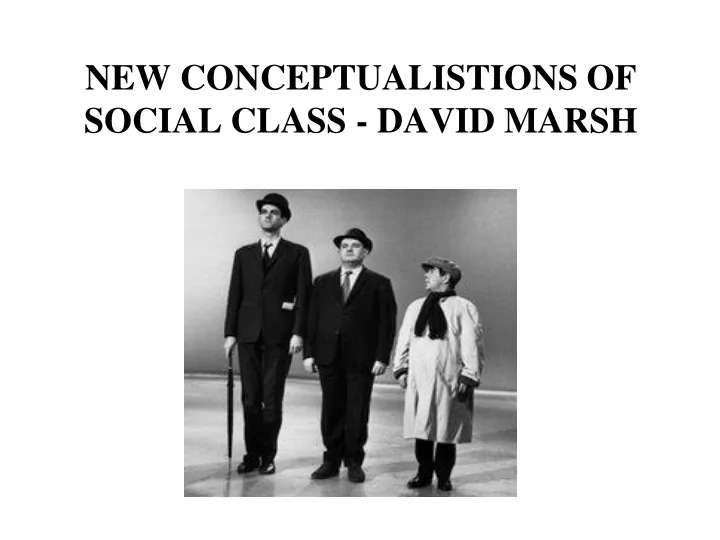

NEW CONCEPTUALISTIONS OF SOCIAL CLASS - DAVID MARSH
TRADITIONAL POSITIONS ON CLASS i) Empirical studies mostly using Weberian- inspired (Goldthorpe and Lockwood) framework, but some Wright’s Marxist- inspired frames – Weberians Won ii) Measures are based on employment location (SES) iii) Ample evidence that this measure of class/SES relates to a great number of outcomes
DEATH OF CLASS • Reflects the Cultural Turn • Consequence/Aspect of Late Modernity • Increased Complexity, Risk and Reflexivity • Class is no longer a given and no longer shapes identity (Class is dead, Gender is dying) identity complex and fluid • So, individuals no longer identify with class and class no longer shapes outcomes
THE BOURDIEUSIAN TURN • A CLEAR DEVELOPMENT – CLASS IS MORE COMPLEX, NO LONGER ROOTED JUST IN OCCUPATION • STARTING BOURDIEU’S POINT IS FORMS OF CAPITAL – ECONOMIC, SOCIAL AND CULTURAL • CLASS AS A RELATIONAL SOCIAL SPACE AND NOT A CATEGORY
BOURDIEU AND A NEW CATEGORISATION OF CLASS • Economic capital: Wealth, Property, Shares etc. BBC survey asked about occupation, earnings, assets and savings • Social Capital social connection, ‘old boy’s network. Asked who you know and how many and whether engaged with any organised groups • Cultural capital Interests. Asked about education, participation in cultural activities
THE GREAT BRITISH CLASS SURVEY (BBC) • Bourdieusian Informed • Academic Drivers from University of Manchester • 2011/2, 140 questions. Completed on-line, 161, 000 respondents • http://www.bbc.co.uk/science/0/21970879
BBC QUESTIONNAIRE
7 CLASS CATEGORIES • Elite: Most privileged group, set apart from other classes because of wealth. Highest scoring economically, socially and culturally • Established middle class: Largest class group and second wealthiest. Also score high culturally and socially • Technical middle class: Small distinct group that aren't so social but have money and are into emerging culture such as gaming, the internet and rock music • New affluent workers: A young group, socially and culturally active with middling levels of income • Traditional working class: Score low economically, socially and culturally but have reasonably high house values and oldest average age • Emergent service workers: New young urban group who don't have much money but are very social and cultural. They "live for today" • Precariat: Poorest, most deprived class who score low economically, socially and culturally
THE FUTURE • EMPIRICALLY – Issues with using this as an independent Variable • THEORETICALLY – Beyond a Structural Approach – Crucially debate evokes, but doesn’t address, 2 Meta-theoretical issues: structure/agency; and the relationship between the material and the ideational
Recommend
More recommend